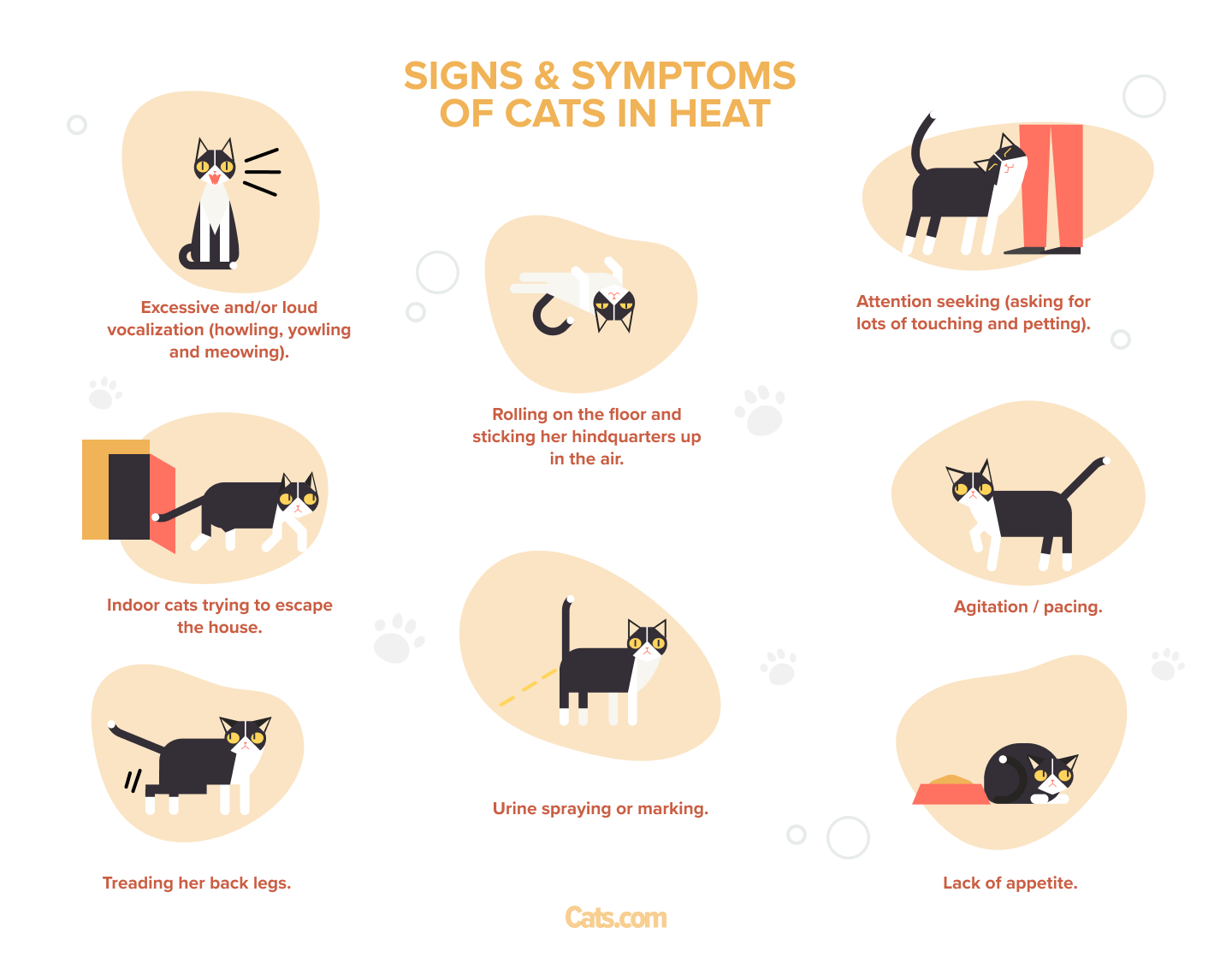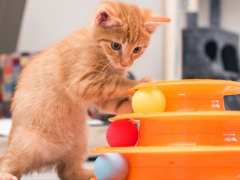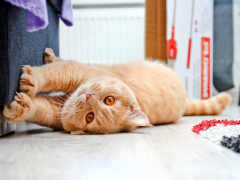
iwciagr / Shutterstock.com
A vaginal discharge is any unusual substance coming from your cat’s vulva. The discharge might be white, creamy, or bloody – and if infection is present, it may be foul-smelling. It is an uncommon symptom in cats, usually related to their urinary or reproductive tract.
A small amount of vaginal discharge can be normal, especially if your cat is not spayed. But it could be a symptom of something much more serious, such as a womb infection. Read on for what can cause vaginal discharge in cats and when to call your veterinarian.
Causes of Vaginal Discharge in Cats
Vaginal discharge is more common in unspayed females, as it is usually related to the reproductive tract. However, there are a variety of causes of this unusual symptom in cats, so let’s go through them now.
Normal Season/Heat

Cats.com image – taken from https://cats.com/cat-in-heat
A cat’s season or heat is the stage of their heat (estrus) cycle when they are fertile and can become pregnant. In unneutered female cats, this happens every 2-3 weeks from around four months old, usually between February and October.
Cats in season usually become very affectionate and ‘flirty’ – and constantly seek attention! They tend to vocalize loudly, roll around a lot, arch their backs, and may urinate in the house. When your cat is in season, a small amount of clear, watery discharge from the vagina can be normal – but shouldn’t last more than a day or two.
Pregnancy and Birth
A small amount of clear, odorless discharge is not usually a concern in pregnant cats. However, if the discharge is thick, colored (anywhere from white to yellow or green), foul-smelling, or contains blood, you should contact your vet.
Vaginal discharge in pregnant cats can be caused by:
- An infection in the womb (pyometra) or vagina
- Miscarriage or spontaneous abortion of the pregnancy
- A problem during labor – if bloody or black/green discharge is seen before any kittens are born you must see a vet immediately
A small amount of red-brown discharge (called ‘lochia’) is normal for a few weeks after giving birth. But this should get less over time and should not smell.
Womb Infection (Pyometra)

Pyometra is a life-threatening condition in cats that requires hospitalization and usually surgery to remove the infected womb. Lebedko Inna / Shutterstock.com
A womb infection – or pyometra – is the most common cause of vaginal discharge in cats. It only happens in cats who have not been neutered, as the womb is removed during neutering.
Cats with pyometra are usually very unwell. They may be lethargic, anorexic (not wanting to eat), urinating and drinking more, and may have vomiting or diarrhea. Cats with a ‘closed’ pyometra may have no visible discharge as their cervix is closed, but there will be pus within their womb. If your cat has an ‘open’ pyometra you will see a thick, creamy, or yellow discharge that is foul-smelling. This is pus draining from their uterus.
Pyometra can be fatal if it is not treated quickly.
Causes of Vaginal Discharge in Spayed and Unspayed Females
Vaginal discharge is rare in spayed females, as their reproductive organs (uterus, ovaries, and fallopian tubes) have been removed. Both spayed and unspayed females can suffer from non-reproductive causes of vaginal discharge, including:
- Urinary tract infections (including bladder and kidney infections)
- Vaginitis
- Foreign bodies
- Tumors
It is also possible that other types of discharge are mistaken for vaginal discharge, such as discharge leaking from the anus or anal glands.
When to Call the Vet
Vaginal discharge is rare in cats – so any concern should always prompt a call to the vet to be on the safe side. You should call your veterinarian immediately if your cat’s discharge is:
- Thick
- Colored – either white, yellow, or green
- Bloody
- Foul-smelling
- Present in large volumes
Or if they show other signs of being unwell.
It can be a little trickier to work out what’s normal in cats who are pregnant, in labor, or have given birth recently. But as a general guide, discharge should never be foul-smelling, green/black (before any kittens have been born), or contain large amounts of blood.
See Cat Pregnancy: Behavior, Timeline, and Signs of Labor for help with knowing what’s normal for pregnant cats.
Treating Vaginal Discharge in Cats

Depending on the cause of the vaginal discharge, your cat may need medication or even surgery. Pixel-Shot / Shutterstock.com
The treatment your cat needs will depend on what is causing their vaginal discharge.
Your veterinarian may need to perform some tests first. An ultrasound scan of their urinary and reproductive tract can help them work out where the discharge is coming from and is the best way to diagnose pregnancy or womb infections, as well as some complications of labor. They may also sample some of the fluid for examination under the microscope. If they are worried about infection, they may send the sample away for culture and sensitivity testing – this will tell them what bacteria is causing the infection, and what medications will be best to treat it. Bloodwork and urine samples may also be taken, to explore your cat’s underlying health and any other potential causes of discharge such as bladder problems.
Depending on the underlying cause of your cat’s discharge they may need medications, such as pain relief, anti-inflammatories, or antibiotics. In the case of womb infections or pregnancy complications, they may also need surgery, such as removal of the womb.
Preventing Vaginal Discharge in Cats
As vaginal discharge occurs most frequently in cats who have not been neutered, the best way to prevent it is to spay your cat. This is a surgical procedure called an ovariohysterectomy where the ovaries, fallopian tubes, and uterus (womb) are removed. Removing the reproductive tract will protect them from womb infections and prevent them from becoming pregnant.
Frequently Asked Questions
Why is my cat leaking white fluid?
If your cat is leaking a small amount of white/clear or odorless fluid from their vulva, they may be coming into heat. This should only last a day or so and be accompanied by other signs of heat such as vocalization, attention-seeking, restlessness, and unusual urination. If the fluid is thick, foul-smelling, or your cat seems unwell you should seek veterinary advice.
Why is my cat leaking brown fluid?
Brown, foul-smelling liquid around your cat’s back end may be fluid from their anal glands. These sit on either side of your cat’s anus and discharge tiny amounts of (very smelly!) fluid when your cat passes feces. If your cat seems uncomfortable, is licking, or this area is inflamed, you should contact your vet. This may be a sign of impacted or infected anal glands.
Is it normal for my pregnant cat to have discharge?
Some discharge can be normal in pregnant cats, especially around the time they are due to give birth. But if the discharge is thick, foul-smelling, green/black (before any kittens are born), or contains a lot of blood, this should prompt a call to your veterinarian.
What does pyometra discharge look like in cats?
Pyometra discharge is usually white, creamy, or yellow/green-tinged. It tends to be foul-smelling. You may notice it coming directly from your cat’s vulva or just matted in the fur around their back end. Cats with pyometra (bacterial infection of the womb) show signs of illness, such as poor appetite, lethargy, drinking and urinating more, and vomiting or diarrhea. Pyometra is a life-threatening condition, so call your vet immediately if you are worried your cat may be suffering from it.







